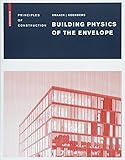Building Physics of the Envelope : Principles of Construction / ed. by Ulrich Knaack, Eddie Koenders.
Material type: TextPublisher: Basel : Birkhäuser, [2018]Copyright date: ©2018Description: 1 online resource (134 p.)Content type:
TextPublisher: Basel : Birkhäuser, [2018]Copyright date: ©2018Description: 1 online resource (134 p.)Content type: - 9783035611458
- 9783035609493
- 690.12
- TH2238.5 .B855 2018eb
- online - DeGruyter
| Item type | Current library | Call number | URL | Status | Notes | Barcode | |
|---|---|---|---|---|---|---|---|
 eBook
eBook
|
Biblioteca "Angelicum" Pont. Univ. S.Tommaso d'Aquino Nuvola online | online - DeGruyter (Browse shelf(Opens below)) | Online access | Not for loan (Accesso limitato) | Accesso per gli utenti autorizzati / Access for authorized users | (dgr)9783035609493 |
Frontmatter -- Contents -- 1 Introduction -- 2 Thermal Energy -- 3 Moisture -- 4 Airtightness -- 5 Acoustics -- 6 Light -- 7 Building Physics in Practice -- 8 Building Physics and Materials -- 9 Building Physics and the Building Envelope -- Authors -- Selected bibliography -- Index -- Illustration credits
restricted access online access with authorization star
http://purl.org/coar/access_right/c_16ec
Die Fassade ist die Schnittstelle des Gebäudes mit seiner Umwelt. Dort treffen bauphysikalische Parameter wie Wärme, Feuchte, Schall und Licht auf das Haus und wirken auf es ein. Alle diese Einflüsse bedürfen der Regulierung durch die Gebäudehülle, um Behaglichkeit für den Nutzer und Funktionstüchtigkeit der Architektur zu gewährleisten. Diese Einführung erläutert die wichtigsten Phänomene, um dann den Bezug zur Baupraxis herzustellen: Welche Materialien reagieren in welcher Weise auf diese Faktoren? Wie gehen Fassadensystemen mit Wärme, Feuchte, Schall und Licht um? Das praxisorientierte Buch, entstanden aus der Zusammenarbeit eines Architekten und eines Bauingenieurs, beschreibt die wichtigsten Fassadenmaterialien und -konstruktionen im Hinblick auf ihre bauphysikalische Performance.
The facade is the building’s interface with its environment. It is here that building physics parameters such as heat, humidity, sound and light interact with the building. All these influences need to be controlled by the building envelope in order to ensure the comfort of the user and the functional performance of the architecture. This introduction explains the most important phenomena and then relates them to design and building practice – which materials react in which way to these factors? How do facade systems deal with heat, humidity, sound and light? This practice-oriented book, which is the result of cooperation between an architect and a structural engineer, describes the most important facade materials and constructions under the aspect of their building physics performance.
Mode of access: Internet via World Wide Web.
In English.
Description based on online resource; title from PDF title page (publisher's Web site, viewed 30. Aug 2021)


